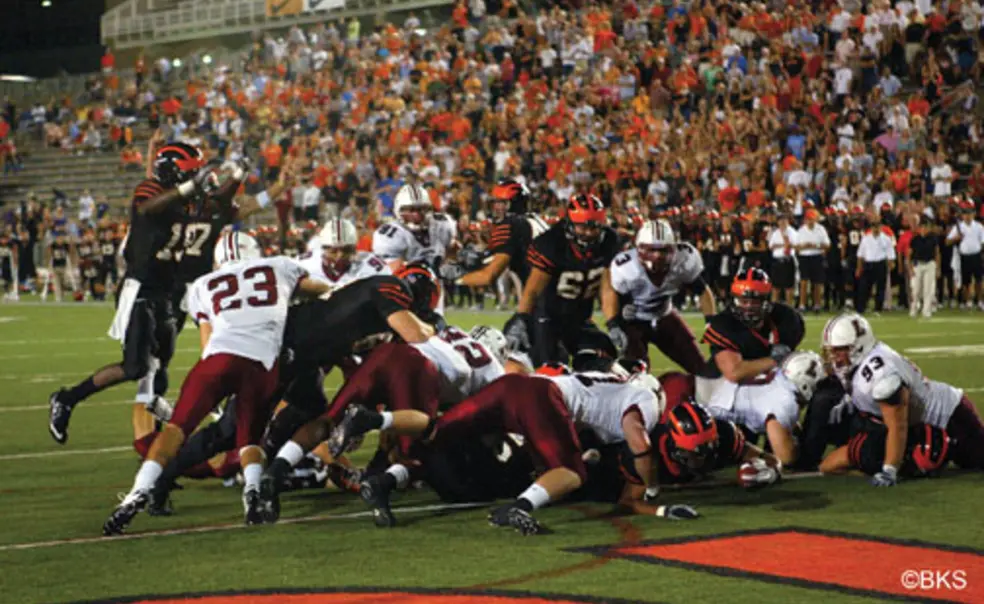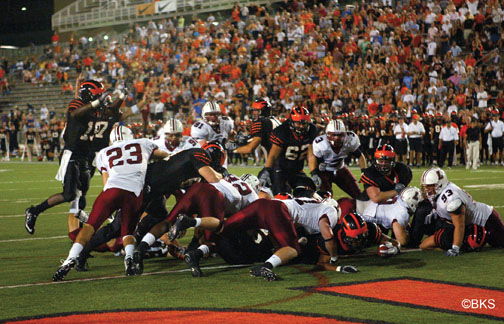Culbreath '11 lifts football with overtime heroics
Jordan Culbreath ’11’s coach has suggested that his story sounds like something from the movies: An undersized walk-on builds himself into the Ivy League’s top rusher, only to see his promising football career cut short by a rare and life-threatening blood disorder. Then, against all odds, he regains his health and returns to the field.
True to cinematic form, the running back’s Princeton Stadium homecoming on Sept. 25 rose toward a climax: Under the lights, the Tigers faced third-and-goal, needing one yard for a double-overtime win over Lafayette. Nearly every soul on the Princeton side of the stadium knew who would carry the ball. Even Culbreath — not prone to drama — felt the weight of the moment. “The team was on my shoulders, and I had to come through for them,” he said.
The leading man took a handoff from quarterback Tommy Wornham ’12 and plunged through the center of the defense, clinching a 36–33 Tigers win. The entire Princeton team flooded the end zone in celebration.
Head coach Bob Surace ’90, fresh off his first win, smiled and asked, “Could it come out any better than that?”
One year and a day earlier, Culbreath left the field at Lehigh with an ankle sprain just before halftime. The trainers and doctors who examined him became concerned about Culbreath’s recent bouts with fatigue. After a series of tests, he was diagnosed with aplastic anemia, a condition in which a person’s red blood cells break down prematurely.
Culbreath received treatment near his northern Virginia home, leaving school for the entire year. He posted an online journal to update scores of friends and fans. In October and November, Culbreath dealt with a series of complications, but by January, his condition started to improve. He began to work out regularly in the spring, and this summer, doctors cleared him to play football. He received a medical hardship exemption from the Ivy League, allowing him to repeat his senior season.
During the fall, Culbreath will continue to receive medication every two weeks and have his blood tested weekly.
Surace cautiously managed Culbreath’s workload in the preseason, but even in the opening weeks of practice, the coach hinted that the former All-Ivy back would be a significant contributor this season. Four days before the Sept. 18 opener at Lehigh, he named Culbreath as the starting running back.
In the Lehigh game — a 35-22 loss — Culbreath was productive, carrying the ball nine times for a team-high 56 yards. He also led the Tigers in rushing with 61 yards against Lafayette. His best run was a 30-yard burst midway through the third quarter, a play that helped to spark Princeton’s second-half comeback.
Princeton’s new coaching staff has adopted a no-huddle, pass-happy offense that produced 891 yards in the season’s first two weeks. While it may be a winning formula, it also means that it’s unlikely Culbreath will carry the ball 20 times per game, like he did in 2008, or rush for 276 yards in one day, as he did against Dartmouth that year.













No responses yet